Share This Article:

Washington, DC (WorkersCompensation.com) – On Thursday, U.S. Reps. John Garamendi, D-Calif., and Hank Johnson, D-Ga., introduced legislation that would require owners of foreign-owned vessels to be held liable for the collapse of the Frances Scott Key Bridge in Baltimore.
The “Justice for Victims of Foreign Vessel Accidents Act" would increase the liability for foreign-flagged vessels to up to 10 times the dollar value of the vessel and its cargo, minus some expenses. The move comes after the owners of the M/V Dali containership took action to limit their liability in the collapse of the bridge.
On March 26, the Dali rammed into the Frances Scott Key Bridge in Baltimore’s Harbor, collapsing it and killing six construction workers who had been working on the bridge. The Dali had been heading out of the harbor at about 1:30 a.m. when it ran into a support pylon for the bridge that spans the Patapsco River. A trestle section of the 1.6 mile-wide span crumpled into the water, sending vehicles and people on the bridge into the river, officials said. Rescuers pulled two men out of the water, one of whom was hospitalized. Those two, and the six who died, had been filling potholes on the surface of the bridge when it was struck.
Current, Proposed Law
Currently, legislation enacted in 1851 allows the vessel’s owners to file petitions in federal court that would limit their legal liability for the damages to the dollar value of the vessel and its cargo, minus expenses. Less than a week after the vessel collided with the bridge, the Dali’s owner, Grace Ocean Private Ltd., moved to do just that, limiting their liability for the bridge repairs and compensation for the families of those killed to $43 million.
Garamundi, a senior member of the House Transportation and Infrastructure Committee and of the Subcommittee on Coast Guard and Maritime Transportation, said the legislation would increase the Dali’s liability to $854 million.
“If the foreign owners of the cargo vessel that took down the Francis Scott Key Bridge in Baltimore think they can leave American taxpayers holding the bag, I have a message for them: you broke it, you bought it,” Garamendi said. “Access to America’s ports and our consumers is a privilege, not a right. If the foreign owners of the Dalia want to keep that privilege, they can break out their checkbooks, call their insurance company, and pay their fair share of the bridge replacement costs and compensation to the families of the six workers who died tragically that day.”
Reactions
Lawyers for the victims applauded the legislation.
“The families of the innocent victims of the Baltimore Key Bridge collapse strongly support the Justice for Victims of Foreign Vessel Accidents Act. This legislation protects all Americans from having their lives shattered by corporate vessels from foreign countries due to preventable failures. This issue is not about whether you are a Democrat or a Republican; it is about whether you love and want to protect Americans. That is why both parties should support this bill and help protect our country when foreign vessels are involved,” L. Chris Stewart and Justin Miller of Stewart, Miller Simmons Trial Attorneys; Dan Rose and Kevin Mahoney of Kreindler & Kreindler; and Craig Sico of Sico Law Group, attorneys for the victims of the Key Bridge disaster, said in a statement.
Why the Change?
Stewart said the Limitation of Liability Act of 1851 would unfairly limit the amount of compensation for families affected by maritime disasters.
"Six days is all it took for Grace Ocean to go to federal court and file for protection," Stewart said. "Grace Ocean is relying on a 173-year-old archaic law to shield them."
Mahoney said the limited liability filing would deprive the injured parties of their right to trial by jury. The attorneys said they intend to conduct their own investigation into the accident and that they intend to file personal injury claims on behalf of the victims’ families.
"In a normal personal injury claim, the injured party takes their time, investigates the claim, and brings the claim to a venue of their choice,” Mahoney said. “And what the Limitation Act does is flip that on its head."
If passed the legislation would go into effect retroactive to March 25, 2024, the night before the bridge collapsed.
AI california case management case management focus claims compensability compliance courts covid do you know the rule emotions exclusive remedy florida FMLA glossary check Healthcare health care hr homeroom insurance insurers iowa leadership medical NCCI new jersey new york ohio osha pennsylvania roadmap Safety state info technology texas violence WDYT west virginia what do you think women's history women's history month workcompcollege workers' comp 101 workers' recovery Workplace Safety Workplace Violence
Read Also
About The Author
About The Author
-
Liz Carey
Liz Carey has worked as a writer, reporter and editor for nearly 25 years. First, as an investigative reporter for Gannett and later as the Vice President of a local Chamber of Commerce, Carey has covered everything from local government to the statehouse to the aerospace industry. Her work as a reporter, as well as her work in the community, have led her to become an advocate for the working poor, as well as the small business owner.
Read More
- Apr 28, 2025
- Liz Carey
- Apr 28, 2025
- Frank Ferreri
- Apr 27, 2025
- Frank Ferreri
- Apr 27, 2025
- Chris Parker
- Apr 27, 2025
- Chris Parker
- Apr 25, 2025
- Liz Carey




